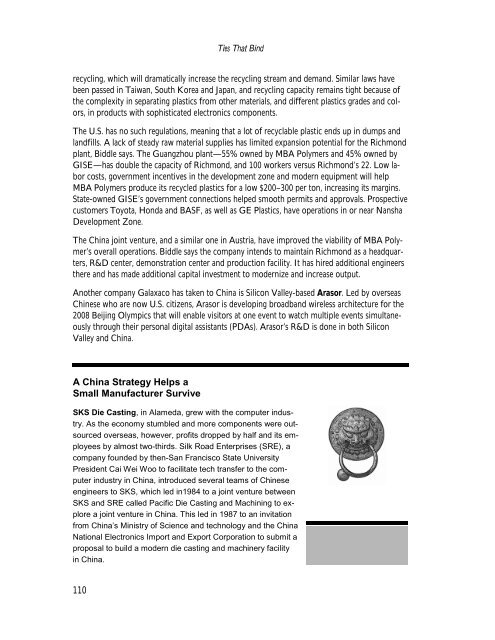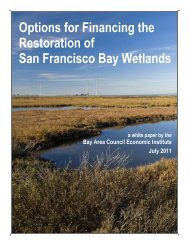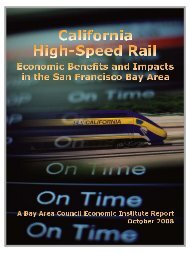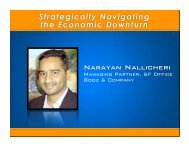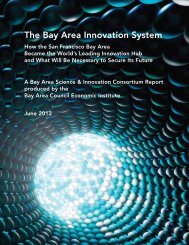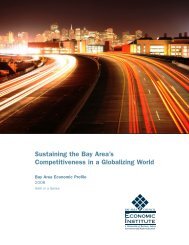Ties That Bind - Bay Area Council Economic Institute
Ties That Bind - Bay Area Council Economic Institute
Ties That Bind - Bay Area Council Economic Institute
Create successful ePaper yourself
Turn your PDF publications into a flip-book with our unique Google optimized e-Paper software.
110<br />
<strong>Ties</strong> <strong>That</strong> <strong>Bind</strong><br />
recycling, which will dramatically increase the recycling stream and demand. Similar laws have<br />
been passed in Taiwan, South Korea and Japan, and recycling capacity remains tight because of<br />
the complexity in separating plastics from other materials, and different plastics grades and colors,<br />
in products with sophisticated electronics components.<br />
The U.S. has no such regulations, meaning that a lot of recyclable plastic ends up in dumps and<br />
landfills. A lack of steady raw material supplies has limited expansion potential for the Richmond<br />
plant, Biddle says. The Guangzhou plant—55% owned by MBA Polymers and 45% owned by<br />
GISE—has double the capacity of Richmond, and 100 workers versus Richmond’s 22. Low labor<br />
costs, government incentives in the development zone and modern equipment will help<br />
MBA Polymers produce its recycled plastics for a low $200–300 per ton, increasing its margins.<br />
State-owned GISE’s government connections helped smooth permits and approvals. Prospective<br />
customers Toyota, Honda and BASF, as well as GE Plastics, have operations in or near Nansha<br />
Development Zone.<br />
The China joint venture, and a similar one in Austria, have improved the viability of MBA Polymer’s<br />
overall operations. Biddle says the company intends to maintain Richmond as a headquarters,<br />
R&D center, demonstration center and production facility. It has hired additional engineers<br />
there and has made additional capital investment to modernize and increase output.<br />
Another company Galaxaco has taken to China is Silicon Valley-based Arasor. Led by overseas<br />
Chinese who are now U.S. citizens, Arasor is developing broadband wireless architecture for the<br />
2008 Beijing Olympics that will enable visitors at one event to watch multiple events simultaneously<br />
through their personal digital assistants (PDAs). Arasor’s R&D is done in both Silicon<br />
Valley and China.<br />
A China Strategy Helps a<br />
Small Manufacturer Survive<br />
SKS Die Casting, in Alameda, grew with the computer industry.<br />
As the economy stumbled and more components were outsourced<br />
overseas, however, profits dropped by half and its employees<br />
by almost two-thirds. Silk Road Enterprises (SRE), a<br />
company founded by then-San Francisco State University<br />
President Cai Wei Woo to facilitate tech transfer to the computer<br />
industry in China, introduced several teams of Chinese<br />
engineers to SKS, which led in1984 to a joint venture between<br />
SKS and SRE called Pacific Die Casting and Machining to explore<br />
a joint venture in China. This led in 1987 to an invitation<br />
from China’s Ministry of Science and technology and the China<br />
National Electronics Import and Export Corporation to submit a<br />
proposal to build a modern die casting and machinery facility<br />
in China.


